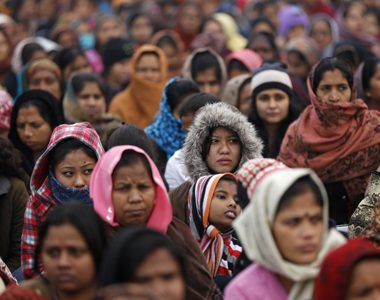A report unveiled by a BBC journalist this week uncovered that in one Indian village alone, up to 90 per cent of women have had the operation, with their families forced to sell family assets and cattle in order to cover the estimated 200 euros in costs.
Many of the women, who campaigners argue are subjected to the ‘unnecessary’ procedures, were found to be at the height of their reproductive lives – in their 20’s and 30’s.
But it seems this village is not an isolated case, in a country that has been under increasing international scrutiny for its handling of crimes against women, following the recent gang-rape and murder of a 23-year-old woman late last year.
Reports reveal an extraordinary high number of women have also had their uteruses removed in a handful of Indian states, including Rajasthan, Bihar, Chhattisgarh and Andhra Pradesh, many of them below the age of 40.
Upon talking to local women, the journalist found that doctors at private clinics often coerced women, who sought medical consultation for their heavy menstrual bleeding, bladder infections and backaches, into the surgery.
An ultrasound was then performed to identify pre-cancerous lesions and a few hours later, many hesitant women were reportedly rushed into theatres, without having the time to consult their husbands and families, or the opportunity to gain a second opinion.
When probed, a local doctor accused of performing many of the women’s’ hysterectomies admitted that most of the time, he does so without conducting a biopsy afterwards. Once the uterus and tissue has been destroyed, it becomes hard to prove that the operation wasn’t justified.
Of even more concern, is that in some cases women are being told they are having a hysterectomy performed and forced to pay the large sum when in actual fact, only a superficial incision is made and the uterus is left intact.
Health activists are convinced that doctors are engaging in this ‘blatant malpractice’ simply for their own personal gain.
“People say that in some places, there are whole districts without uteruses,” Dr Narendra Gupta, from a local Oxfam-partnered charity says.
“It seems that private doctors see this as an opportunity to make a fast buck. They’re making money on ailments which could be treated in a simpler, less invasive way,” Gupta insists.
Ceri Averill, Oxfam’s health policy advisor, compared the situation of women in India who have had hysterectomies, to their British counterparts:
“In the UK, a hysterectomy is very rarely performed to save life so other treatment options are usually explored first. In order to confirm a diagnosis of cancer, doctors would first perform a biopsy and other lab tests. In some cases, they would treat with radiotherapy and/or chemotherapy before recourse to a hysterectomy.”
“The vast majority of hysterectomy cases in the UK involve women between the age of 40 and 50. It is rare for a woman in her 20s or 30s to have one. Even when a hysterectomy leaves the ovaries intact, it may trigger menopause. The operation can also lead to incontinence, irritable bowel syndrome, depression, back pain, loss of sexual pleasure, thrombosis and vaginal prolapse,” Averill added.
Dr Vineeta Gupta, a local gynaecologist, believes much of the problem is that rural doctors will give cancer diagnosis more readily, and have helped to create a fear among local women.
“That’s very wrong. When patients come to me, I tell them that an infection doesn’t cause cancer. We’ll cure the infection, I tell them, and you will be completely all right. Some are convinced but some are not convinced because they’ve been told: ‘If you don’t get your uterus removed you will get cancer and die,” Gupta said.
The startling discovery comes amidst a rapid expansion of small private health clinics and hospitals in remote and rural areas of India which are reportedly poorly served by the government-run health system.
Many campaigners and activists believe the clinics are necessary in areas where people need to have access to medical care. But, they argue that these doctors and clinics should be regularly monitored and regulated to ensure they are providing a standard level of care.







